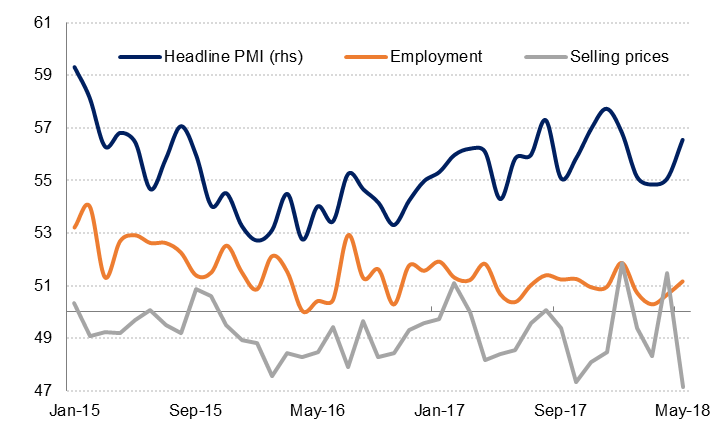
In our January 2018 Monthly Insights, we predicted that governments across the GCC would increase spending this year following two years of relative austerity. For the UAE specifically, we noted that “the public sector [was] expected to be the main engine of growth this year…with infrastructure spending set to pick up as the country [prepared] to host Expo 2020, and some public sector wage growth likely as well.” We also highlighted the fact that household consumption would be constrained by higher fuel costs (on the back of higher oil prices) as well as the impact of VAT on the general cost of living.
Six month on, fiscal data and recent announcements by the authorities in Dubai and Abu Dhabi show that this has largely been the case. Quarterly budget data for Saudi Arabia show that current spending increased nearly 24% y/y in Q1 2018, including wages, subsidies, grants, and social benefits paid to households to help mitigate the impact of VAT. However, capital spending was nearly -11% lower than in Q1 2017, so the total increase in budget spending was just under 18% y/y. The sectors which benefitted the most from the higher budget spending in the first quarter of this year were health & social development and military spending (which remains the largest category of budget spending).
We expect the increase in government spending in Saudi Arabia to be maintained through the rest of this year, particularly as oil revenues are likely to be substantially higher than budgeted. However, we note that increased spending on military and defence is less likely to drive domestic economic activity as most of these goods are manufactured abroad and imported. Indeed, the PMI survey data suggests that so far, the increased spending is not driving faster growth in the non-oil sector. While the headline PMI recovered slightly in May, it remains well below the series average.
.png)
Source: IHS Markit, Emirates NBD Research
The UAE does not publish quarterly fiscal accounts, but here too there are indications that spending has increased this year, and probably by slightly more than we had anticipated in January. In addition to an annual bonus for all public sector employees, the government of Abu Dhabi also announced a AED 50bn stimulus package (over three years). Details on where the money will be spent are still to be released, but at least a portion will likely be used to fund 10,000 new jobs for Emiratis. However, the Abu Dhabi municipality has also announced it will increase the tax on expats resident in the emirate to 5%-7.5% of annual rents, from 3% currently.
Dubai has also recently announced several reforms and measures to stimulate growth in the emirate and ease some pressure on households. However, these measures are geared towards reducing the cost of doing business and lowering taxes, rather than increasing budget spending. They include reducing the municipal tax for businesses, writing off administrative fines owed by businesses, and scrapping 19 fees related to aviation. Dubai has also frozen school fees for the next academic year, providing some relief for households facing higher fuel costs (up more than 22% y/y in H1 2018) and VAT.
Survey data for Dubai and the UAE more broadly have been encouraging; both the UAE PMI and the Dubai Economy Tracker have posted readings in the mid-50s so far this year, with the Dubai Economy Tracker rising to 57.6 in May. While these figures suggest a solid expansion in the non-oil private sectors, this appears to be occurring on the back of price discounting by firms which are competing to attract new business. As a result of these margin pressures, firms appear to be reluctant to increase employment or wages. In this respect, the measures announced by Dubai to reduce the administrative costs to businesses should provide some relief, even in the short-term.
 Source: IHS Markit, Emirates NBD Research
Source: IHS Markit, Emirates NBD Research